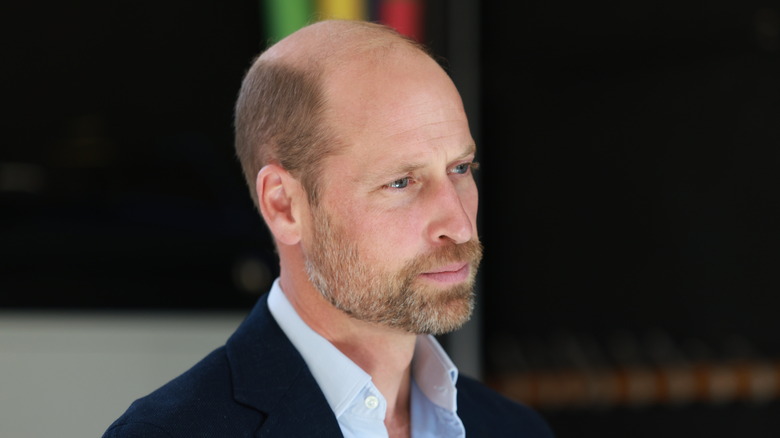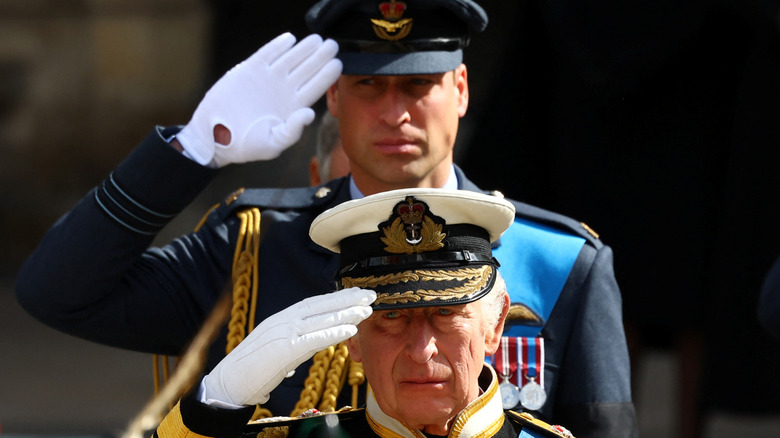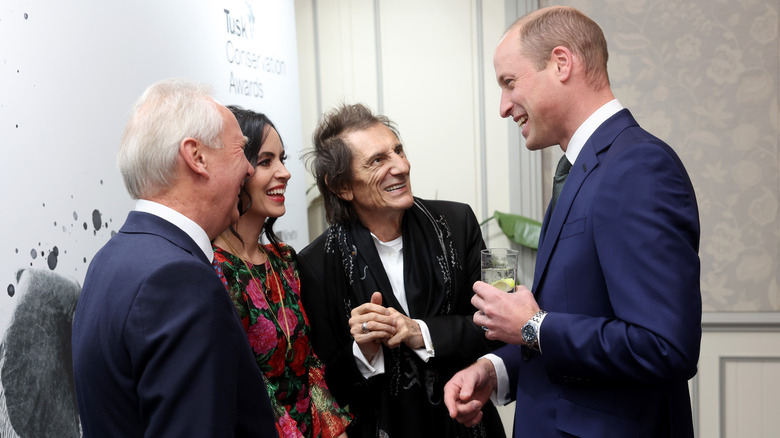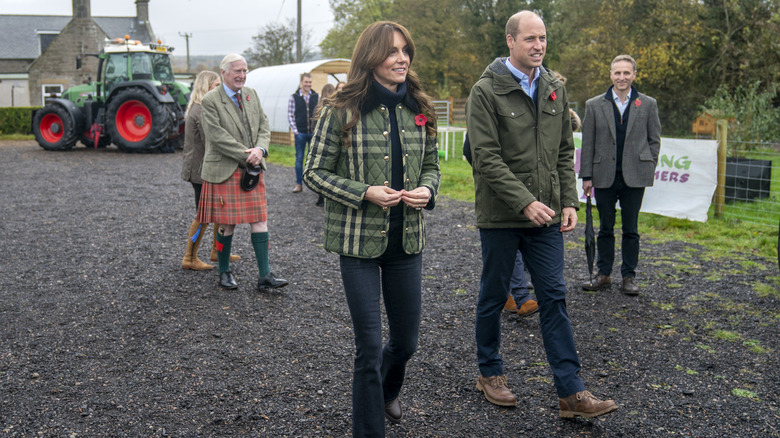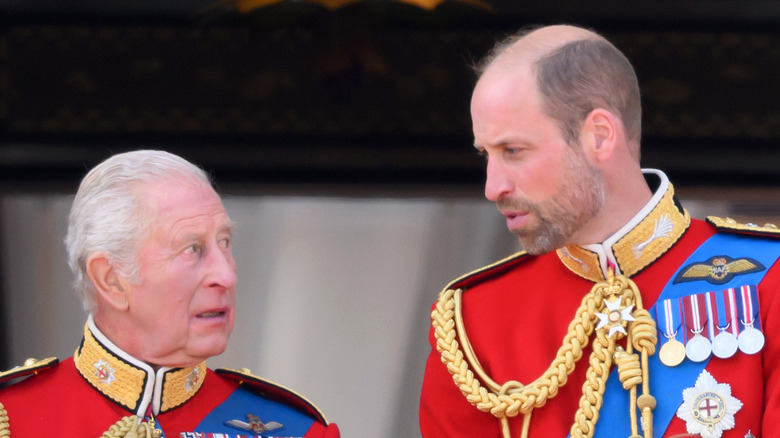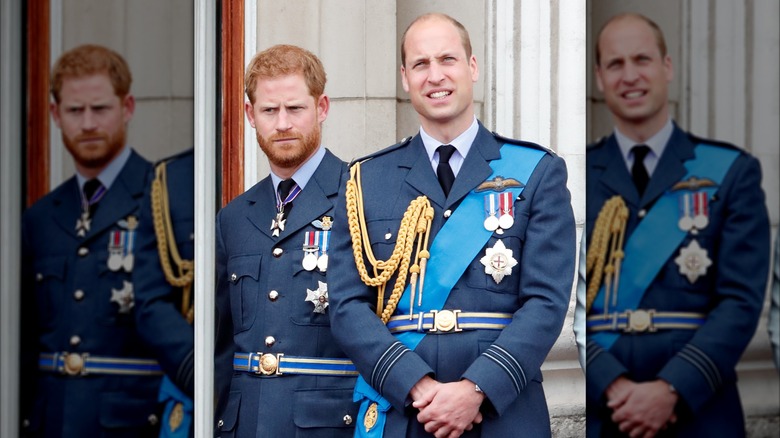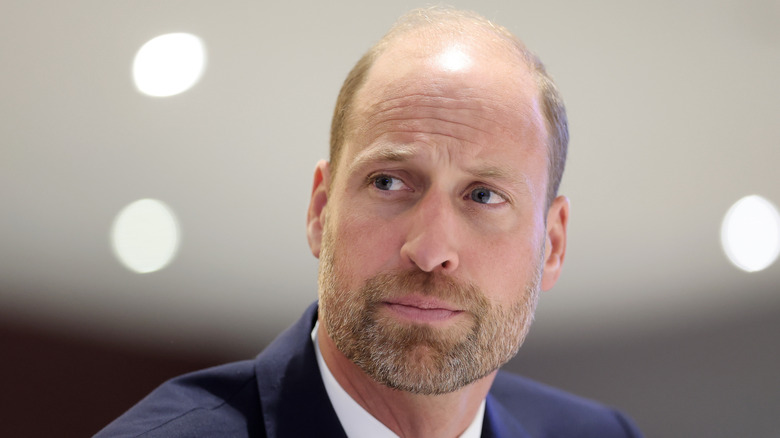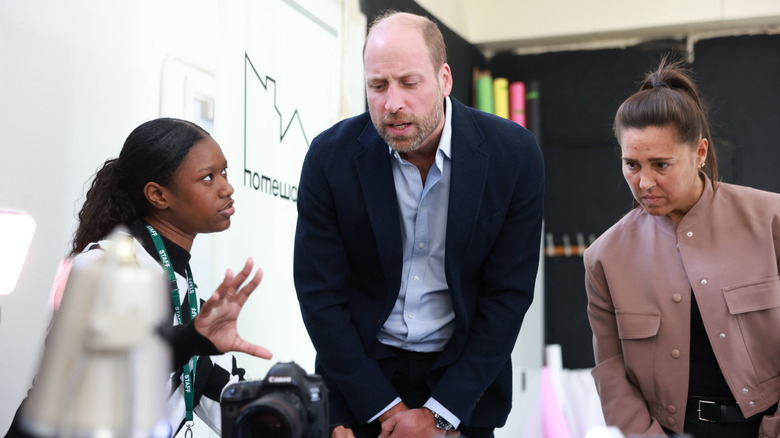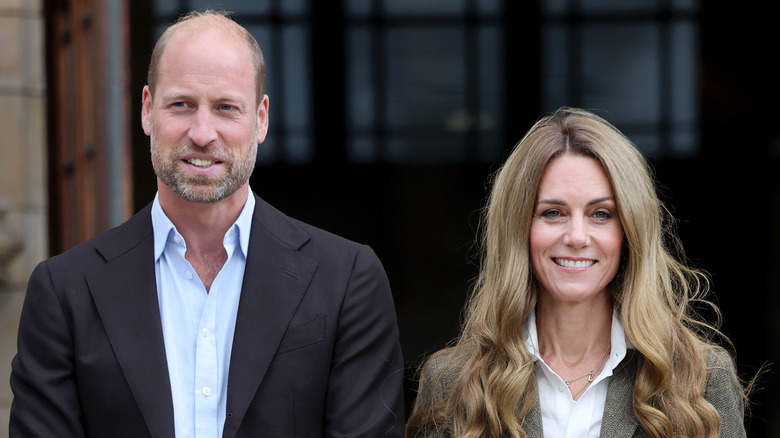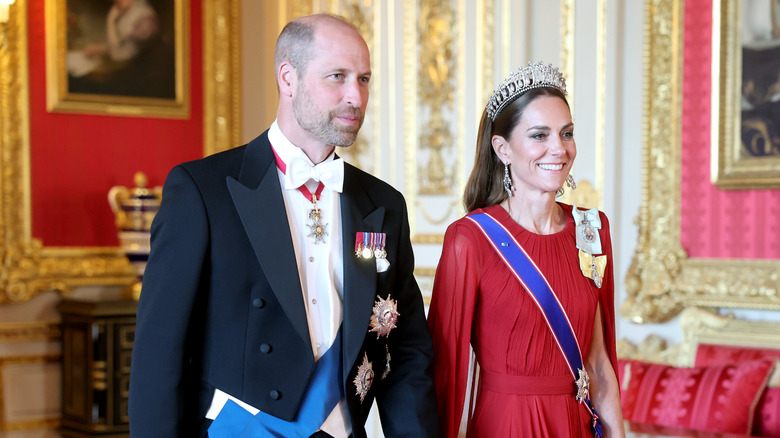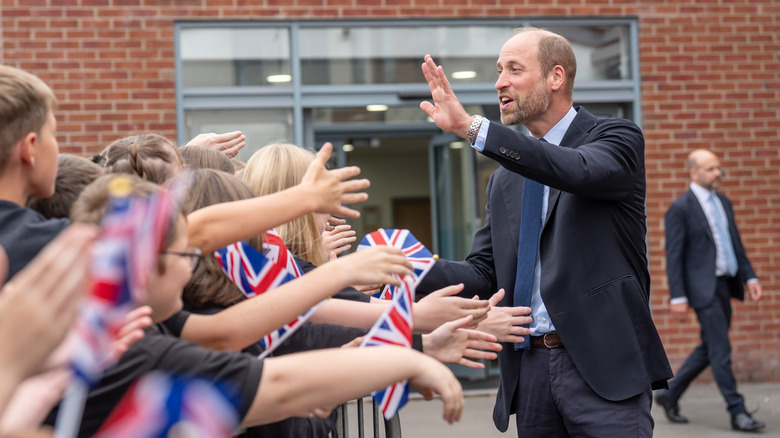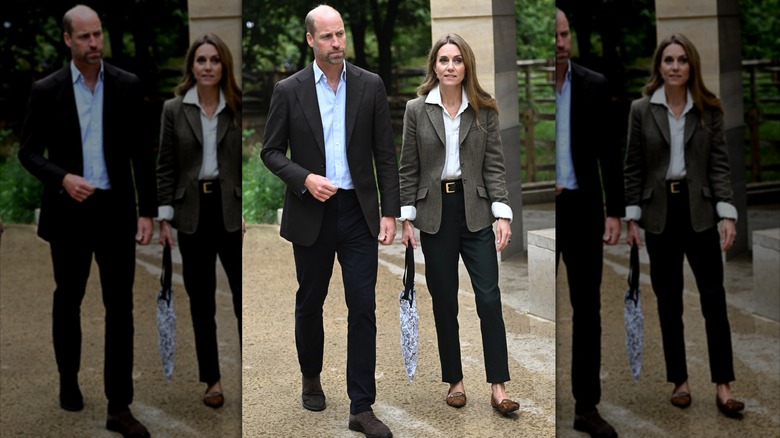Prince William Was Never The Same After Queen Elizabeth's Death
On September 8, 2022, Queen Elizabeth II died. This tragic event immediately catalyzed a series of events that would change the British royal family forever. First and foremost, her eldest son, then-Prince Charles, became King Charles III. The matter of Camilla, Duchess of Cornwall's title remained unclear, as not everybody was certain that it would be appropriate for her to become queen. Nobody opposed Prince William's ascension to Prince of Wales, however. He had been training for this role his entire life.
Following Queen Elizabeth's death, King Charles made his mark on the monarchy. But, he was not the only one to change the House of Windsor. As the Prince of Wales, William also took on more royal responsibilities — and began to have a greater impact on the system. Since 2022, William has tried to change the monarchy's image, bringing a casual touch to his role. He has also attempted to reign in the royal family's spending habits and make the palace greener — goals that have been met with some resistance. Ultimately, though, as much as William has tried to change the system, it has also changed him. Since the loss of his grandmother, William has arguably become a more decisive and determined royal.
Prince William mourned Elizabeth II's death
When Queen Elizabeth II died at the age of 96, the United Kingdom mourned its beloved monarch. For Prince William, however, the loss was much more personal. After all, he had lost the beloved grandmother who he referred to as "grannie." In a public statement, William expressed gratitude for all the memories that he shared with the late monarch. "And while I will grieve her loss, I also feel incredibly grateful. I have had the benefit of the queen's wisdom and reassurance into my fifth decade. My wife has had twenty years of her guidance and support. My three children have got to spend holidays with her and create memories that will last their whole lives," he shared (via People).
Of course, William and Elizabeth had a unique relationship. As the oldest son of the queen's oldest son, William stood to one day follow in her footsteps as sovereign. Because of this, Elizabeth spent many extra hours with William, guiding him toward his future responsibilities. Or, as royal expert Robert Lacey told Grazia, "There has always been a special closeness between William and the Queen, and she has taken a particular interest in him." Apparently, Elizabeth even gave William lessons on becoming a leader. "When William became a teenager, she would have him at Windsor Castle and would open the state boxes and guide him through the papers. It was William's constitutional education," Laey added.
William decided to be a more casual Prince of Wales
Just because Prince William studied under Queen Elizabeth II, however, does not mean that he sought to emulate her in every way. Upon becoming the Prince of Wales, William decided to take a more modern approach to his role — one that was much more casual than in decades past. Whereas many of William's predecessors kept the public at arm's length, he decided to be more approachable. Soon after William gained his new title, royal correspondent Charles Rae told The Guardian, "There's going to be a lot more friendly handshakes and possibly hugs, rather than the formality that we've seen in the past." Thus far, this prediction has proven true, with William physically embracing people from across the United Kingdom rather than just offering them a little wave.
Beyond the type of contact that William has established with the British people lies the prince's overall demeanor. Since gaining his title, William has connected with people by dressing in normal business casual clothes instead of formal wear. He has even demonstrated his interest in the sorts of activities enjoyed by non-royals — a move that has won people over in droves. "Whether it's watching football, enjoying a curry, attending a concert or sipping a pint at the pub, the future king seems to give off a down-to-earth charm that resonates with many," Rebekah Absalom wrote for the Daily Mail.
The prince decided not to hire too many staff
If Prince William's public image seems much more casual than that of previous heirs, that's because he has worked hard to move away from the pomp and grandeur of his position. When King Charles III was Prince of Wales, a tell-all alleged that he didn't like to prepare his own toothbrush for use. Apparently, his personal valet, Michael Fawcett, had to put his toothpaste over the bristles. Rumor has it that Charles' team also had to pre-select his pajamas for him. The result? Charles cultivated a reputation for being out of touch.
Desperate to create a different sort of image for himself, William chose to hire very little help for his family. Shortly before Queen Elizabeth II's death, he moved into Adelaide Cottage — and refused to take on a live-in staff. As former palace butler Grant Harrold told Page Six, "They wanted to do stuff themselves. They were carrying their own stuff, doing their own washing up, their own cooking. They are very much still like that. [William] is very hands-on."
Ultimately, this approach has allowed William and Princess Catherine to foster a more normal family life. Speaking to the Daily Mail, a source close to the couple mused, "I think it would surprise people to see how ordinary things are at home. The children help with laying the table, clearing their plates when they've finished eating..." This habit has helped establish the Waleses as more laid-back royals.
Prince William began to clash with King Charles III about how to approach the monarchy
Because Prince William took such a unique approach to his Prince of Wales role, it was perhaps inevitable that he would disagree with older royals. King Charles III was said to be particularly frustrated with William's more laid-back image. As a former staffer explained in an interview with the Daily Beast, "To William, continuing to run the monarchy as though it were still an Edwardian institution feels absurd. To Charles, his son's more casual approach can feel like a lack of respect for duty and tradition."
Rumor has it that these differences have added tension to Prince William's complicated relationship with King Charles III. Privately, William is said to hold a great deal of resentment toward the way Charles treated Princess Diana. Several sources even claimed to the Daily Beast that the two men rarely speak face-to-face. That being said, the prince's respect for hierarchy is believed to be stronger than his desire to reinvent his role. As a friend of Williams told the publication for the same article, "Ultimately, William is a loyal soldier. He respects his father's rank, and he respects his father's right to make his own decisions."
Prince William felt called to protect the monarchy from Prince Harry
Prince William's relationship to King Charles III is not the only royal family dynamic that changed after Queen Elizabeth II's death. Months after the monarch's passing, Prince Harry released a tell-all memoir, "Spare," that made several accusations about Prince William. In one section of this book, Harry even alleged that William and Princess Catherine encouraged him to wear a Nazi uniform to a costume party. These details threatened the idea that William would one day be fit to reign over the United Kingdom. They also may have weakened the institution of monarchy itself.
Following the publication of "Spare," William adopted a tougher attitude toward Harry. Commenting this in an interview with Fox News Digital, royal expert Hilary Fordwich said, "its acerbic accusations against the royal family, particularly his denigration of the Princess of Wales, rendered it the 'final straw' as William told those around him." In her view, William was concerned that Harry's book would detract from the rest of the monarchy's work. "As a millennial, he won't and can't risk public association with disastrous members of the family who merely serve as distractions from public duty," Fordwich added.
He fought to cut the royal family's budget
It's hardly a secret that members of the British royal family live lavish lives, but Prince William wants to change that. In light of the United Kingdom's cost of living crisis, the prince has grown aware of his immense privilege. He has also come to understand that average Brits might not be too keen on supporting princes and princesses who spend excessively. With this in mind, William has tried to cut the royal family's budget. Speaking to InTouch, one palace insider dished, "He wants expenses to be monitored closely, and any fat trimmed straight away. He doesn't want there to be any sense that special perks are being handed out to the royals." He even removed Queen Camilla's sister, Annabel Elliot, from the royal payroll.
But, nepotism is not William's only worry. Chief among William's concerns is the royal family's less-than-green habit of traveling via private jet. Private flights burn both cash and jet fuel, and a monarchy that supports environmentalist causes cannot join the "jet set" and be taken seriously. As the aforementioned insider told InTouch in the same interview, William "has put out this edict that the rest of the family needs to get on board with being as green as possible. Private flights and that sort of thing are being frowned on ... The days of wasteful spending and overconsumption are ending."
William stepped up when his father was diagnosed with cancer
On February 5, 2024, King Charles III announced that he had been diagnosed with cancer. "During The King's recent hospital procedure for benign prostate enlargement, a separate issue of concern was noted. Subsequent diagnostic tests have identified a form of cancer," read a statement from Buckingham Palace (via People). Although Charles continued to perform many of his royal duties following the diagnosis, Prince William was expected to take on a more important role during his father's recovery. "He supports King Charles, carrying out state and national duties regularly," royal expert Helena Chard told Fox News Digital. "He has surprisingly taken to the role like a duck to water, commanding center stage at every event."
Of course, not all aspects of this transition went smoothly. There were several moments when leadership was lacking. "Now, there is something of a power vacuum. When the King is unavailable, who is in charge? Is it Camilla or William? No one can truly say," wrote royal expert Richard Kay for the Daily Mail. He went on to critique William for failing to attend the final match of the Women's World Cup in Sydney, which England lost to Spain. "Many felt that, as President of the Football Association, he should have attended," Kay noted. This experience, ultimately, showed William that increasing his leadership within the monarchy would also open doors to criticism.
Prince William strove to change the royal family's view of work and illness
Unfortunately, King Charles III was not the only member of the royal family to announce a cancer diagnosis in 2024. On March 22 of that same year, Princess Catherine released a statement reading, "In January, I underwent major abdominal surgery in London and at the time, it was thought that my condition was non-cancerous. The surgery was successful. However, tests after the operation found cancer had been present" (via CNN). For Prince William, this was a sign that he needed to put his family first. Although he continued to perform royal duties while Catherine was undergoing treatments, William prioritized her.
This move represented a sharp change from previous generations of royals, who tended to put duty before family. And while some older members of the British elite have allegedly taken issue with this — most notably, Princess Anne — the public has largely supported the prince. As royal expert Rhiannon Mills wrote for SkyNews, "But talking to people in Glasgow, away from the royal visit, I overwhelmingly found most thought William was setting a good example by putting family first." By supporting his wife and breaking from the royal family's "duty first" mantra, William was able to redefine the palace's work culture. He also made himself easier to relate to in the process.
He opposed King Charles' reunion with Prince Harry
Prince William has changed a number of his attitudes since Queen Elizabeth II's death. However, he has remained consistent in his feud with Prince Harry. In September 2025, when Harry went to Clarence House to make amends with King Charles III, William did not appear to be interested in attending the meeting. To the contrary, the heir to the throne reportedly seemed vehemently opposed to any kind of reconciliation. In an interview with Page Six, former palace butler Grant Harrold explained that the issue pertained to trust. He asked, "If they reconcile, then fall out again, what's to say there won't be another book, Netflix series or interview about it?"
Sources claimed that Charles and Harry's meeting represented a productive first step toward reconciliation. However, that apparently did little to alter William's opinion on the matter. If anything, alleged one insider to the Daily Mail, that just made things worse. "William is back at the point where if you mention Prince Harry in his presence he would throw you out of the room. He's doubling down," they said. A second source claimed that William no longer has the energy to deal with any more Harry-related drama: "William originally went through all the stages of grief over his brother ... He never expected to be regularly in the same post code as his brother again, like he was last week."
Prince William began to imagine a monarchy that completes projects
In the years since Queen Elizabeth II's death, Prince William has reflected more about his own goals for the monarchy. Some reports indicate that the Prince of Wales would like to use his position to make more of a difference in the world. Chatting on "The Royal Beat," royal expert Kate Mansey dished, "I wrote a profile about William recently, and someone very close to him was saying that this is a move away from these classic kinds of patronages, where you would go and support an existing charity, to actual projects." In many ways, this goal recalls the ways his mother, Princess Diana, used her celebrity status for good. However, it would also break from years of royal tradition.
In the same episode of the "The Royal Beat," Mansey went on to call this idea "quite a radical departure, really, from what the king does, or what the late queen did." That being said, it might be the only way to make William feel like his time on the throne was worth it. As Mansey noted, the prince "wants to come away and think, 'I've made a difference there, there's money that's gone into that community centre or there's something that's happened because I went there,' rather than just showing up and shaking some hands."
Prince William and Princess Catherine looked forward to moving into their forever home
When Queen Elizabeth II took the throne in 1953, she didn't want to move into Buckingham Palace. She dreamed of living in Clarence House but was required to change her residence out of tradition. Decades later, it seems that Prince William and Princess Catherine may get the chance to reside where they please. The couple have reportedly made plans to move to Forest Lodge — and stay there for good. A palace source told the BBC that the Waleses would like to live at Forest Lodge forever, indicating that they will likely choose to stay there after one day becoming king and queen.
The same source also said that the couple look forward to moving away from Adelaide Cottage — the place where they lived during Catherine's cancer treatments. "Windsor has become their home. However, over the last few years while they have lived at Adelaide Cottage there have been some really difficult times," the insider explained. "Moving gives them an opportunity for a fresh start and a new chapter." Considering that William and Catherine's new chapter involves a stunning old eight-bedroom house, it will be interesting to see whether or not they manage to balance their laid-back vision of the monarchy with the lifestyle that their roles require.
